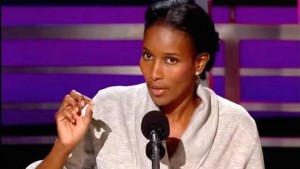Home » Commentary » Opinion » Promoters of ‘tolerance’ are selective

 Self-identifying promoters of ‘tolerance’ have shown, once again, they’re only willing to tolerate that which they deem worthy of being tolerated. If you’re not on their list, you don’t get a say.
Self-identifying promoters of ‘tolerance’ have shown, once again, they’re only willing to tolerate that which they deem worthy of being tolerated. If you’re not on their list, you don’t get a say.
Prominent critic of Islam, Ayaan Hirsi Ali, wasn’t on the list. She was forced to cancel her speaking tour of Australia due to concerns about her security and the security of the venues hosting her.
“Islam is not a religion of peace,” Hirsi Ali, a former Muslim, has said. In her book, Heretic, she calls for Islam to have a reformation to counter what she names as the religion’s endemic violence.
Opposition to Hirsi Ali’s Australian visit was led by the Council for the Prevention of Islamophobia and a Change.org petition denouncing her for inciting division and fuelling hatred of Muslims.
She acknowledges her frank views have earned her condemnation from many orthodox Muslims, as well as from the so-called “regressive” Left – those on the Left who appear to excuse intolerable Islamic practices, such as child marriage, in the name of multiculturalism.
None of these reactions to Hirsi Ali’s proposed visit are a surprise. Activist campaigns to silence and censor dissenting views – always conducted in the name of ‘tolerance’ – are now a mainstay of daily politics.
But this is not the live-and-let-live form of tolerance and multiculturalism that used to describe how people from different backgrounds took their place in Australian society at their own pace and in their own way.
‘Multiculturalism’ is now used in a new, prescriptive way that emphasises the importance of allowing communities to preserve all their cultural and ethnic practices in the name of inclusion — even if some of those practices are considered abhorrent in our Australian society.
Perhaps this ‘tribal’ multiculturalist pact with diversity lies behind the decision of the Royal Commission into Institutional Responses to Child Sexual Abuse not to investigate Islamic groups.
The Commission’s brief is to investigate how institutions like schools, sports clubs and religious organisations have responded to allegations and instances of child sexual abuse.
Since it was set up four years ago, the Commission has interviewed thousands of survivors or witnesses alleging sexual abuse within any institution where adults have had contact with children.
Churches and schools have been called to account and have paid out millions of dollars in compensation. But it appears that no Islamic organisation has been called before the Commission.
Yet we know that female genital mutilation and forced child marriage continue to occur within Muslim communities and are sanctioned by imams, some of whom have faced court as a result.
So-called ‘progressives’ who are horrified – and rightly so – by child sexual abuse in churches become silent and strangely regressive when it comes to criticising any of these Islamic practices.
They see themselves as open-minded, supportive of LGBTI rights and marriage equality, and suspicious of bishops. But when it comes to Islam and sharia law, they find nothing to criticise.
Perhaps the regressives feel guilty about the legacies of imperialism and colonialism. Or they think Muslims lack the emotional resilience to be challenged on their beliefs about gays and children.
Activists censoring Hirsi Ali claim to be fighting Islamophobia. But their own intolerant attitudes — and their refusal to judge Islam as they judge the rest of us — might do more harm to the standing of Islam in Australia than any visiting speaker ever could.
Peter Kurti is a Research Fellow at the Centre for Independent Studies
Promoters of ‘tolerance’ are selective